

 |
 |
|
 |

|
| About Us |
|
Read Past Issues | Resources | Composer Links |
Leonard Bernstein (1918-1990) was the last classical musician of our time to be a household name; no one since has achieved the level of fame with the general public as Bernstein. Bernstein became an American icon not only because of his ability to conduct and compose, but also because of the power of his personality and his passion to communicate, through music, about life, love and the human condition. Youngsters (and adults) in the 1960s and beyond were the beneficiaries of Bernstein's intense music making and insightful commentary on his "Young People's Concerts." This upcoming radio event took six years to produce. It is, says producer Steve Rowland, "a story -- a profound and multi-layered story with many fascinating twists: the number and variety of people, places, ideas and artistic issues that Bernstein worked with, came into contact with, and ultimately affected is stunning. And on top of his extraordinary talents in music, as a composer, a conductor, a performer and educator, there was still more: He occupied a place in American culture as a voice of conscience, a voice for peace, a supporter of democracy in its broadest vision, and a force working to bring the world together through music and art. These 11-hours of radio tell a monumental story." Virtually
every aspect of Bernstein's career and life will be explored through the
words of Bernstein's own correspondence as well as interviews with more
than one hundred people who knew and worked with him. These luminaries
include
Alec Baldwin will voice the majority of the correspondence written by men; Broadway star Donna Murphy (currently performing in Bernstein's Wonderful Town) will read the female letters; daughter Jamie Bernstein will voice Bernstein's own letters; and Schuyler Chapin, NYC's Cultural Commissioner and Bernstein's record producer and longtime friend, will voice the letters of European composers. These excerpts were compiled from some 17,000 pieces of correspondence held by the Library of Congress. The eleven programs are: (1) Bernstein: The Early Years; (2) Twelve Gates to The City (Meeting the Mentors); (3) New York, New York; (4) Tonight; (5) A New Frontier/The Philharmonic Years; (6 and 7) Bernstein: The Conductor; (8) Crossroads; (9 and 10) Bernstein: The Composer; and (11) A Candle Burned At Both Ends. Few if any American personalities have received this in-depth treatment in the mass media; nothing quite like it has been aired on radio in this country. The series will be heard in virtually every major, medium and small market in America, as well as internationally, through the WFMT Radio Network. For additional information, biographies and a carriage list of stations airing LEONARD BERNSTEIN: AN AMERICAN LIFE, please visit http://www.wfmt.com/bernstein/. |

|
21st Century Schizoid Music: New Music for New Audiences
Flute & percussion duo Due East (Greg Beyer, percussion; Erin Lesser, flute) will perform one of the premieres using an innovative setup combining drumset, vibraphone, and several Deer Park water jugs. Two other premieres will be performed by a 13-voice chamber chorus consisting primarily of members of the Canticum Novum Singers, Trinity Choir, and Cerddorion. The selections include "This Living Hand," with a text by John Keats; and "We Kindle This Fire This Day," a setting of a traditional Summer Solstice prayer. The second half of the concert will feature the debut of Capital M (Peter Hess, clarinets and saxophones; Alex Weinstein, electric guitar; Adam Caine, electric guitar; Bradley Kemp, bass guitar; Greg Beyer, drums; Ian Moss, processed vocals). Guided by influences as diverse as Steve Reich, King Crimson, Godspeed You! Black Emperor, and Japanese avant-jazz guitarist Uchihashi Kazuhisa, the music of Capital M occupies the enigmatic territory between hard rock, experimental jazz, and early minimalism. Composer and bandleader Ian Moss brings a background in classical composition and choral singing to bear on a striking mix of conceptual daring and visceral immediacy. Admission to the show costs $10 and requires the purchase of one drink. Complimentary tickets will be furnished to members of the press. Concertgoers are advised to arrive early to ensure seating. Ian David Moss began his musical studies at the age of 12 by transcribing classics from the Wee Sing songbook for his computer’s monophonic PC speaker. His first major composition was a "rock symphony" written as an independent study project during his senior year in high school. A scant six years later, his music is drawing widespead praise for its innovation and sensitivity. Primary composition teachers have included Phil Kline, Nick Didkovsky, Joan La Barbara, John Halle, and Matthew Suttor. While earning a degree in music at Yale University, he served as the Undergraduate Assistant Conductor of the Yale Glee Club, and for two years as President of the Yale College Composers’ Group, an organization he founded in the fall of 2000. He has sung baritone with the Canticum Novum Singers, the Choral Arts Society of Philadelphia, and the Yale Glee Club at venues including Carnegie Hall, Avery Fisher Hall, Philadelphia's Kimmel Center and Academy of Music, and the Cathedral of St! . John the Divine. His work has been read or performed by ensembles including the Choral Arts Society of Philadelphia, the Yale Symphony Orchestra, and the Way Blue Bucket. By day, Ian is Development & Marketing Associate for the American Music Center. "21st
Century Schizoid Music" is an ongoing series curated by Frank Oteri, editor
of the award-winning monthly magazine www.newmusicbox.org.
It is an exploration of music by New York-based composers who write contemporary
concert works and also play in eclectic downtown bands. Each concert will
present both halves of the composers' split identities. "In the world we
now live in, multi-tasking is the norm," comments Oteri. "So it's totally
natural that so many composers and musicians nowadays not only maintain
day jobs that have nothing to do with their music, but maintain several
different musical personae which often have nothing to do with each other.
It is in that spirit that we present 21st Century Schizoid Music as part
of the Cornelia Street Café's new One Drink Minimum Series on Monday
nights. If there are connections between the various strands of music we
are each making, they are for the audience to decide!" Past concerts have
featured Kitty Brazelton, Derek Bermel, Steven Swartz, and Oteri himself.
Old Stuff An Interview with Tobias Picker Handmaid Tale's Debuts in English Rautavaara Joins B&G Who's Afraid of Julia Wolfe Derek Bermel's Soul Garden The Pianist: The Extraordinary True Story of Wladyslaw Szpilman John Adams' Atomic Opera A Bridge Not Far Enough Turnage Signs With B&H Sophie's Wrong Choice Copland's Mexico On Being Arvo Rzewski Plays Rzewski Praising Lee Hyla David Lang's Passing Measures
|

Infernal Violins Performer(s): Angele Dubeau, Le Pieta Analekta Call
it Angèle meets the devil. Call it crossover. But resistance
is futile.
|

Knoxville: Summer of 1915 / Essays for Orchestra Karina Gauvin, soprano / Thomas Trotter, organ / Royal Scottish National Orchestra / Marin Alsop, conductor Gramophone made this its top pick of the month and it's easy to understand why. The young Canadian soprano Karina Gauvin delivers a drop-dead gorgeous reading of Barber's magical setting of a James Agee poem. Marin Alsop is also excellent in the two Essays for orchestra, works written for Bruno Walter and Eugene Ormandy, respectively. |

Piano Trios 1 & 2 Vitebsk Trio Composers: Shostakovich, Copland Trio Wanderer harmonia mundi Two well-known masterpieces by Dmitri Shostakovich are paired to fine effect with a less well-known ‘Russian’ work by Aaron Copland. Copland’s infrequently heard Vitebsk Trio of 1929 is an early work, based on a Jewish theme the composer heard at a performance of Dybbuk, a play by Shalom Ansky (who was born in the town of Vitebsk). The work combines elements of the neoclassicism and folk style of Stravinsky with experiments in polytonality and microtones. Brilliantly performed by Trio Wanderer. |

Symphony No.1, Phantasmata The Baltimore Symphony Orchestra, David Zinman First Edition First
released on Nonesuch in 1989, this all-world-premiere title, which
did much to bring Rouse’s immense talent to a wider public, boasts 24-bit
newly remastered sound and the complete and lively interview with the composer
conducted by Glenn Watkins. Conductor David Zinman’s close collaboration
with Rouse ensured that the introspective Symphony No. 1 (with its references
to Bruckner and Shostakovich) and the highly surreal Phantasmata triptych
received maximum voice.
|

Tirol Concerto, Passages Dennis Russell Davies (piano) Stuttgart Chamber Orchestra Orange Mountain Philip Glass’ Tirol Concerto for Piano and Orchestra was commissioned by the Tyrol, Austria Tourist Board and had its world premiere at the Tyrol Festival “Klangspuren” in Jenbach, in 2000. While staying in Tyrol, Glass studied sound documents and sheet music of Tyrolese folk-music. In his Tirol Concerto, played here by conductor/pianist Dennis Russell Davies and the Stuttgart Chamber Orchestra, This disc also features selections from Passages, Glass's collaboration with Indian Sitar master Ravi Shankar, as arranged by Davies. |

Rachmaninov Transcriptions, Corelli Variations Olga Kern was awarded the Gold Medal at the Eleventh Van Cliburn International Piano Competition in 2001 - the first woman to garner that honor in over thirty years. On her new release Olga Kern performs a dazzling program of Rachmaninov’s piano transcriptions of of music by Bach, Bizet, Kreisler, Mendelssohn, Mussorgsky, Rimsky-Korsakov, Schubert and Tchaikovsky, his Corelli Variations, and the Liszt Hungarian Rhapsody No. 2 — with Rachmaninov’s own cadenza, transcribed from his recordings. |

Belshazzar's Feast Composer: William Walton Performers: Purves, Lindley, Daniel Naxos Sir William Walton's Belshazzar's Feast, composed in 1930-31, is the finest British choral work since Elgar's Dream of Gerontius, although it is far more "modern." Scored for baritone, choir and orchestra Belshazzar is a compact work lasting just under 45 minutes. It recounts the Biblical story of the downfall of the proud Belshazzar, King of Babylon whose doom is foretold by a ghostly hand writing the chilling prophecy on the wall during a banquet. Walton's dazzling and often times startling music is gripping from the first bar to the last. |

Letter to Warsaw Jane Eaglen, soprano / Mina Miller, piano / Music of Remembrance / Gerard Schwarz, conductor American composer Thomas Pasatieri created this powerful song cycle, setting six texts by poet/cabaret artist Pola Braun, who wrote these texts while in the Warsaw Ghetto and in the Majdanek concentration camp, where she perished in 1943. The poems bear poignant, painful witness to the disruption, forced disintegration and, finally, destruction of daily life of every Jew in Poland in World War II. Pasatieri is best known for his many film orchestrations including Road to Perdition, Finding Nemo, and Angels in America. Here, he takes full advantage of Jane Eaglen's glorious voice and his orchestrations reveal a composer of considerable depth. |
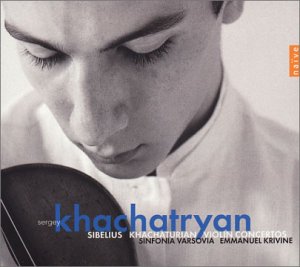
Violin Concertos Composers: Sibelius, Khachaturian Performers: Sinfonia Varsovia, Emmanuel Krivine Naive (Naxos) 18-year-old Armenian wunderkind tosses off the Sibelius with a dazzling display of sheer virtuosity and delivers a much deeper, more sober reading of his fellow countryman's bouncy masterpiece than we are accustomed to hearing. Eye-opening performance and a performer to watch.
|
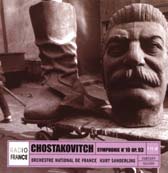
Symphony No. 10 Composer: Dmitri Shostakovich Kurt Sanderling (conductor) Orchestre National de France Naive (Naxos) Re-issue
of an inspired 1978
|

Seven: A Suite for Orchestra Composer: Tony Banks Performer: London Philharmonic Orchestra, Mike Dixon Naxos Tony
Banks, founder of the rock band Genesis, goes "classical" with this
seven-movement suite, each of them an orchestral sound picture using its
title to set the mood. The result is an extremely well-recorded bag
of ambiant musical noodles that are less frivelous than they might have
been and, in any event, less painful to the ears than listening to
Phil Collins sing.
|
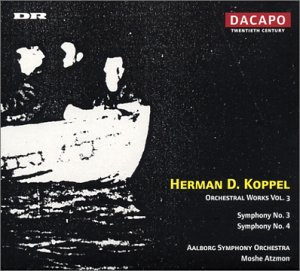
Symphony No. 3 Op. 39. Symphony No. 4 Op. 42 Composer: Herman D. Koppel Conductor: Moshe Atzmon, Aalborg Symphony Orchestra Da Capo [Naxos] During the German occupation of Denmark in World War II, Herman D. Koppel, who was Jewish, and his family had to flee to Sweden, where they met a childhood friend of Koppel who had become a baroness. In her house Koppel could compose in peace and quiet. The Third Symphony is dedicated to her. Despite his own safe surroundings, Koppel’s experience of the war, and of the execution of his Polish-Jewish family in German concentration camps, had a profound impact on his works from this period. These are works of anguish that explore the depths of the composer's emotions--a final liberation from the bloodless influence of his teacher Carl Neilsen--and the birth of major, overlooked 20th century music figure. |

Die Jakobsleiter Composer: Arnold Schoenberg, Henschel, Meier, Nagano Harmonia Mundi One of many important large-scale fragments left uncompleted by Schoenberg at his death, the oratorio Jacob's Ladder was finished by Winfried Zillig, once a student, at the behest of Schoenberg's widow after his death. Schoenberg wrote the libretto between 1915 and 1917 based on the book of Genesis, overlaid with elements from Strindberg's drama Jacob Wrestles, and Balzac's novel Seraphita. He wrote a large of chunk of the music shortly after but was called to the army and never got around to finishing it. This is a brilliant, committed performance that captures a little-known masterpiece by one of the 20th century's greatest composers at the height of his creative powers. |
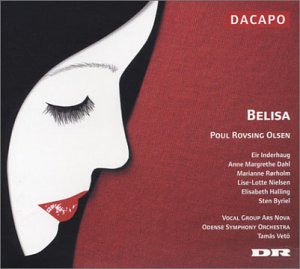
Belisa Composer: Poul Rovsing Olsen Performer(s): Inderhaug, Byriel, Rorholm, Veto Da Capo [Naxos] When composing his music for Belisa, Poul Rovsing Olsen was deeply inspired by Spanish poet Federico García Lorca's drama and by the passionate and demanding character of Belisa herself. The opening scene of the opera is the wedding night of Belisa and Don Perlimplin, where the young bride takes 5 lovers in front of her decrepit groom that is sound asleep. The drama develops from stylized opera buffa into the ambiguous and surreal with an unexpected ending, and Poul Rovsing Olsen's music reflects Lorca’s drama like a sensuous kaleidoscope with French and Oriental overtones. |
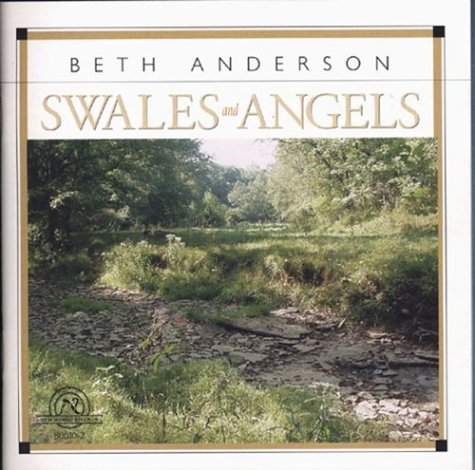
Swales and Angels Composer: Beth Anderson Conductor: Gary M. Schneider Performer: Rubio String Quartet, Jessica Marsten (soprano), et al. New World Records Beth
Anderson's unabashedly romantic "swales" are as pure as a Kentucky mountain
spring, frisky as a new-born colt rolling in bluegrass, and infectious
as a third-grade measles outbreak. They are light, without being
lightweight, and conquer the ear by their deceptively easygoing charm.
If you like Paul Schoenfeld's brand of Americana, you'll like these pieces
a lot.
|
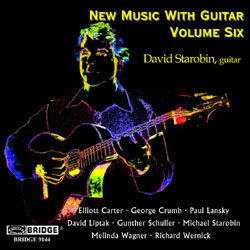
New Music With Guitar, Volume Six Composers: Various Performer: David Starobin Bridge Records No one has done more to champion guitar music by contemporary composers than the brilliant guitarist and co-founder of Bridge Records, David Starobin. This CD includes solo and chamber works written between 1992 and 2000 by Gunther Schuller, Michael Starobin, Richard Wernick, Melinda Wagner, David Liptak, and Paul Lansky--all in premiere recordings. Volume Six also contains George Crumb's "Mundus Canis"--with the composer performing (and whispering and yelling) on percussion. To conclude the disc, Elliott Carter's fantastically inventive sextet, "Luimen" is performed by Speculum Musicae, New York City's virtuoso new music band. |
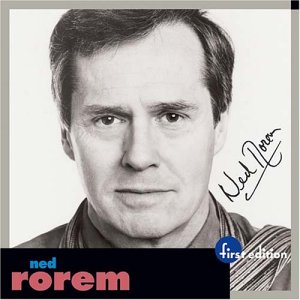
11 Studies for 11 Players: Piano Concerto Composer: Ned Rorem Performer(s): , Lowenthal, Mester, Louisville Orchestra First Edition Rorem ages well and a recent spate of re-releases of his early chamber and orchestral works demonstrate that he is a good deal more than simply a master of art songs. Like most of Rorem's work, 11 Studies is distinctly more European than American and recall Berio's marvelous Sequenzas. |
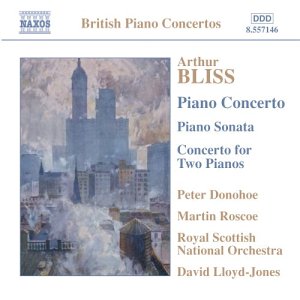
Piano Concerto. Concerto for two pianos. Piano Sonata Composer: Arthur Bliss Performers: . Peter Donohoe, Martin Roscoe (pianos), Royal Scottish National Orchestra, David Lloyd-Jones (conductor). Naxos The piano concerto is rip-snorting, full-blooded, heavy breathing romantism of the Rachmaninov variety played with over-the-top virtuosity by the nimble Peter Donohoe. Listening to it makes you want to invade Russia. |
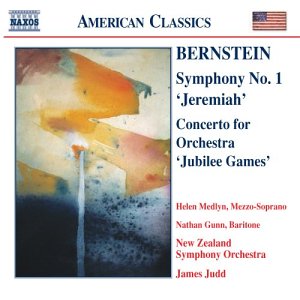
Symphony No.1, 'Jeremiah'. Jubilee Games Composer: Leonard Bernstein Performers: Helen Medlyn (mezzo), Nathan Gunn (baritone), New Zealand Symphony Orchestra, James Judd (conductor). Naxos Young Bernstein, filled with piss and vinegar and more musical ideas per page than any eight of his contemporaries. A joy to listen to a genius in the process of finding his compositional voice. |
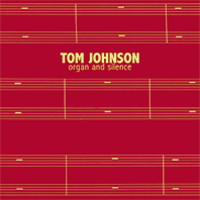
Organ and Silence Composer: Tom Johnson Performer: Wesley Roberts, organ A collection of 28 organ pieces to be played separately or as a long recital A music concerned for, as the author writes in the disc notes, "… the importance of silence in music…". This work is conceived not "for organ" but, really, for "organ and silence", as the silence is a fundamental part of it, and it’s not possible to give it up. It’s an attempt, as the author explain " to permit as much silence as possible, without allowing the music to actually stop". Tom Johnson is one of the masters of minimalism, but he combines this with rigorous logic. His work, free from false glitters, defines, better that any other one, the sense of a research the goes beyond the strict genre definitions, and become poetic application of original ideas. |
 |
Search WWWSearch www.sequenza21.com |
